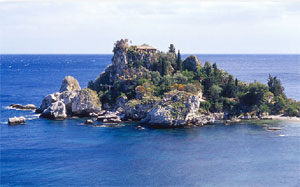Home - In and around
AEOLIAN ISLANDS, SICILY
The Aeolian Islands provide an outstanding record of volcanic construction and destruction, and volcanic phenomena.
Designed by 18° century, the Islands have provided the science of volcanology examples of two types of eruption (Vulcanian and Strombolian) and, therefore, have a prominent place in the training of Geologists from more of 200 years.
The Aeolian Islands lie off the North coast of Sicily.
The group is made up of seven islands (Lipari, Vulcano, Salina, Stromboli, Filicudi, Alicudi and Panarea) and five small islets (Basiluzzo, Dattilo, Lisca Nera, Bottaro and Lisca Bianca) Panarea near.
The total area of the Aeolian Islands is 1,216 km2.
The Islands vary in size, from Panarea, which has an area of 34 km2, in Lipari, 376 km2.
The Aeolian Islands are all of volcanic origin, separated from the Sicilian coast 200 m water depth.
It seems that had never been in contact with lâ island of Sicily.
The Islands have provided examples of two types of eruption (Vulcanian and Strombolian) to volcanology and geology.
Designed by 18° century, the Islands have provided the science of volcanology examples of two types of eruption (Vulcanian and Strombolian) and, therefore, have a prominent place in the training of Geologists from more of 200 years.
The Aeolian Islands lie off the North coast of Sicily.
The group is made up of seven islands (Lipari, Vulcano, Salina, Stromboli, Filicudi, Alicudi and Panarea) and five small islets (Basiluzzo, Dattilo, Lisca Nera, Bottaro and Lisca Bianca) Panarea near.
The total area of the Aeolian Islands is 1,216 km2.
The Islands vary in size, from Panarea, which has an area of 34 km2, in Lipari, 376 km2.
The Aeolian Islands are all of volcanic origin, separated from the Sicilian coast 200 m water depth.
It seems that had never been in contact with lâ island of Sicily.
The Islands have provided examples of two types of eruption (Vulcanian and Strombolian) to volcanology and geology.



